I give over a lot of my brain space, limited though it may be, to thoughts on the human condition and the trappings and failings that come with it. The non-human world follows its own rhythms without apparent concern for me or my kind.
From the windows near my work space, I notice the ungainly, fledgling birds, the green-dusted moth, the second litter of rabbits, the black snake massaging its musky scent onto the root-riddled soil that proved a poor location for vegetables. I notice but don’t introduce myself or invite conversation. I am a commuter bound for a place of productivity. I tell myself, before fully considering the possibility, that there isn’t time for more.
Nature knows nothing of time or productivity. She does without doing.
In the context of my working life, which I expect to maintain for as long as I can, I often wish for fewer commitments and more control over my schedule. I’ve longed for this for the longest time, yet nothing has changed. After four decades of this behavior, I’m finally coming to a realization: I’m the one in charge, and I am, apparently, disinclined to do things differently. I could establish new boundaries. I could unload the unnecessary. I could cordon off portions of the day, or days of the week, or weeks of the year, setting them intentionally aside to experience whatever it is I am meant to encounter in my “free time.” But I don’t.
This is not to suggest that I can’t, or I won’t. I’m merely making the point to myself, and anyone else who might be following along, that I consistently reject options that would allow me to reclaim moments that are otherwise occupied.
I don’t have to show up on the digital page every week. I don’t have to read what anyone else writes. I don’t have to exercise. Though I do, more than ever, want to pay attention to how power is wielded around the world, I am not required to invest a single second in it. No one but me demands that I head up the community garden, that I grow plants of any kind, that I shop at the farmers market, cook food, clean house, call friends, decipher ingredient labels, dehydrate my nuts, DIY my face care products, wander around aimlessly on social media platforms until I come across a video compilation of cats falling into bathtubs that I share with my adult children so that the next day I can see the ‘ha-ha’ reaction they’ve left and relish the notion that we enjoyed a momentary connection.
I decide. I make these choices because they satisfy a part of me that needs to be satisfied. The outcomes may not always have the feel of fulfillment, but if I weren’t benefitting somehow, I’d be more motivated to change.
And even after all of that, all my busy-botheredness, I still, in truth, have time.
I am reminded of delightful little book I read years ago called The Tao of Pooh, in which author Benjamin Hoff illustrates the similarities between the much beloved bear and the ancient principles of Taoism. “And what is Taoism?” he asks on the book’s jacket. “It’s really very simple. It calls for living without preconceived ideas about how life should be lived.”
Like the vast majority of people, I am surrounded by examples of how other humans do all of this (:waves arms like a drunk conductor:). If I want to gauge how I’m doing in comparison to others, I need not look far. I wonder: If mine were the only life I had to examine, would I long for anything at all?
Leading with a quote from A. A. Milne’s, The House at Pooh Corner, Hoffman writes:
They walked on, thinking of This and That, and by-and-by they came to an enchanted place on the very top of the Forest called Galleons Lap... It was the only place in the Forest where you could sit down carelessly, without getting up again almost at once and looking for some where else. Sitting there they could see the whole world spread out until it reached the sky, and whatever there was all the world over was with them in Galleons Lap.
There the Pooh books come to an end, in the Enchanted Place at the top of the Forest. We can go there at any time. It's not far away; it's not hard to find. Just take the path to Nothing, and go Nowhere until you reach it. Because the Enchanted Place is right where you are, and if you're Friendly With Bears, you can find it.
I walked outside the other day for a reason I no longer remember. Just over the edge of our low deck, in a spot where we often land a little too hard, having stepped down from where there is no step, I discovered two, big honkin’ lizards—broad-headed skinks if you’re feeling sciency. The difference in their sizes suggested that it was a male-female pair. He was at least eight inches long.
Her length was a little harder to estimate, because she was missing her tail, evidence of an encounter with something that did not have her best interests in mind. In self-defense, through a process called autotomy, many lizards can drop their tails, which continue to move and twist independently, distracting the predator long enough for the prospective prey to scurry away.
This somewhat horrifying miracle of biology has happened with smaller skinks on my kitchen floor, so I can tell you with authority that it’s true. (You’ll be tempted to watch this video, I’m sure, even if you’re squeamish.) Fortunately for most lizards, the tail will regenerate, though it will never be as long or colorful as the original.
I was surprised by how still this pair was. Though I’ve not, to my knowledge, had occasion to observe this species with this level of scrutiny before, every previous skink I’ve encountered has dashed off at the mere hint of a human. These two were practically motionless, giving me time to take several pictures from where I stood above.
When I walked around to peek at them from a new angle, they moved just a few feet away and paused again. The larger of the two, with the brightest head—later confirmed to be the male—skittered up the foundation wall, while the other lingered on the ground nearby.
With my two new acquaintances just over leg-length away, I sat on the ground and marveled at how unperturbed they were by my presence. I watched their sides scoop and fill with each breath, their burnt orange hues so striking in the afternoon light. I watched them close their eyes, as if to catch a moment’s rest, and wondered if I’d happened upon them just after mating.
When I walked away to collect a chair, my plan was to sit with them for as long as they would tolerate my company. But when I returned, they were gone. I didn’t see them again. I suppose they decided it was time to move on.
I stayed there a good while afterwards, appreciating them, the experience, and the day. I felt the familiar tug of symbolism and story leading me toward messages of resilience, rebirth, and regeneration, but I resisted the urge to attach my very human ideas to their moment. Not doing was enough.
~Elizabeth
Above: A pair of broad-headed skinks on a June afternoon. They don’t actually do much in the 1:17 of this short film. And I think that’s the point.

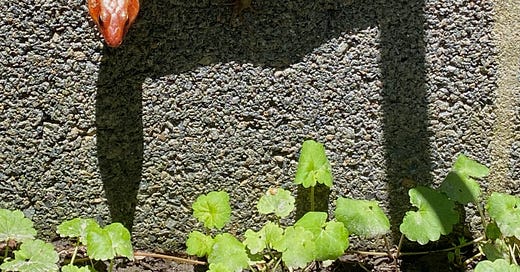


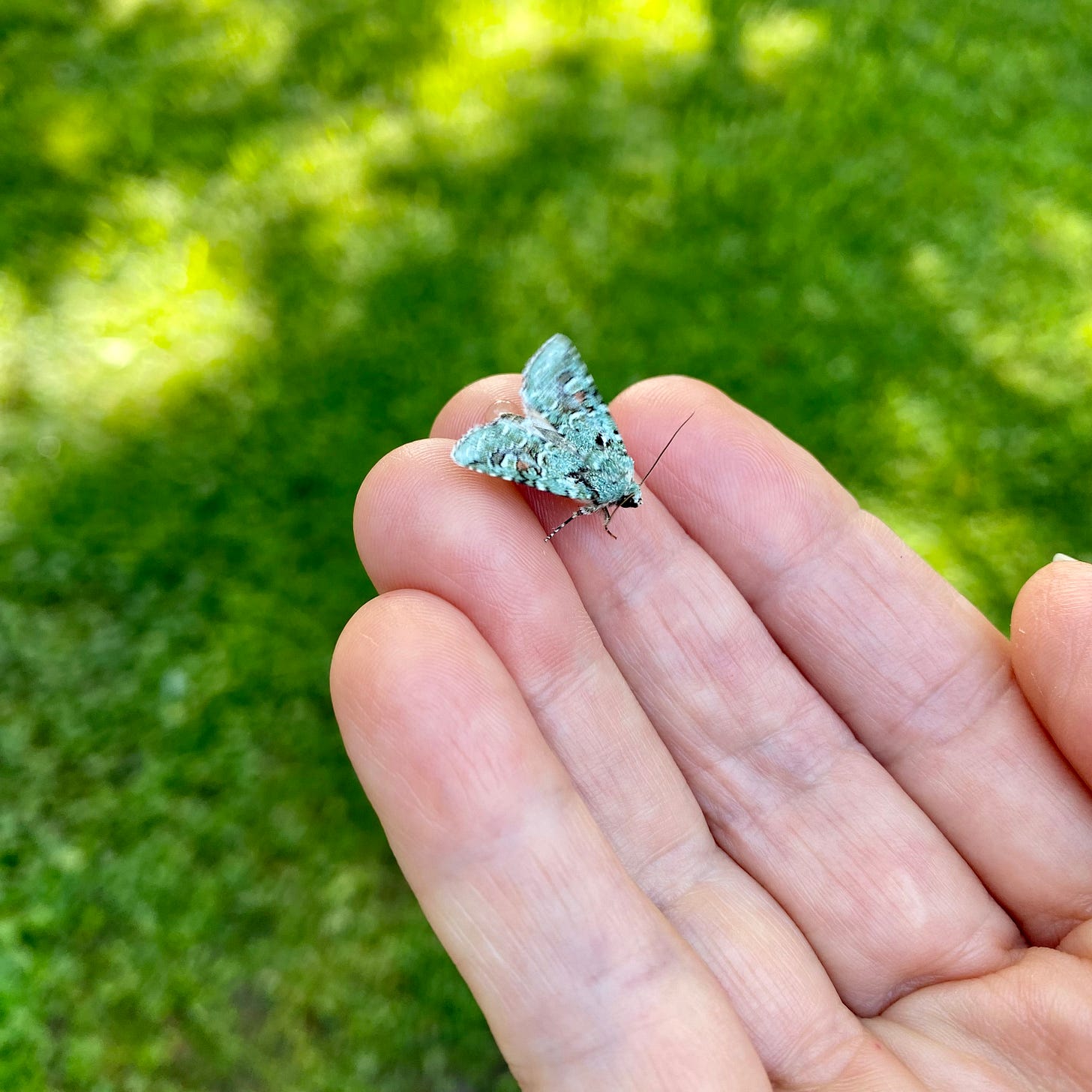
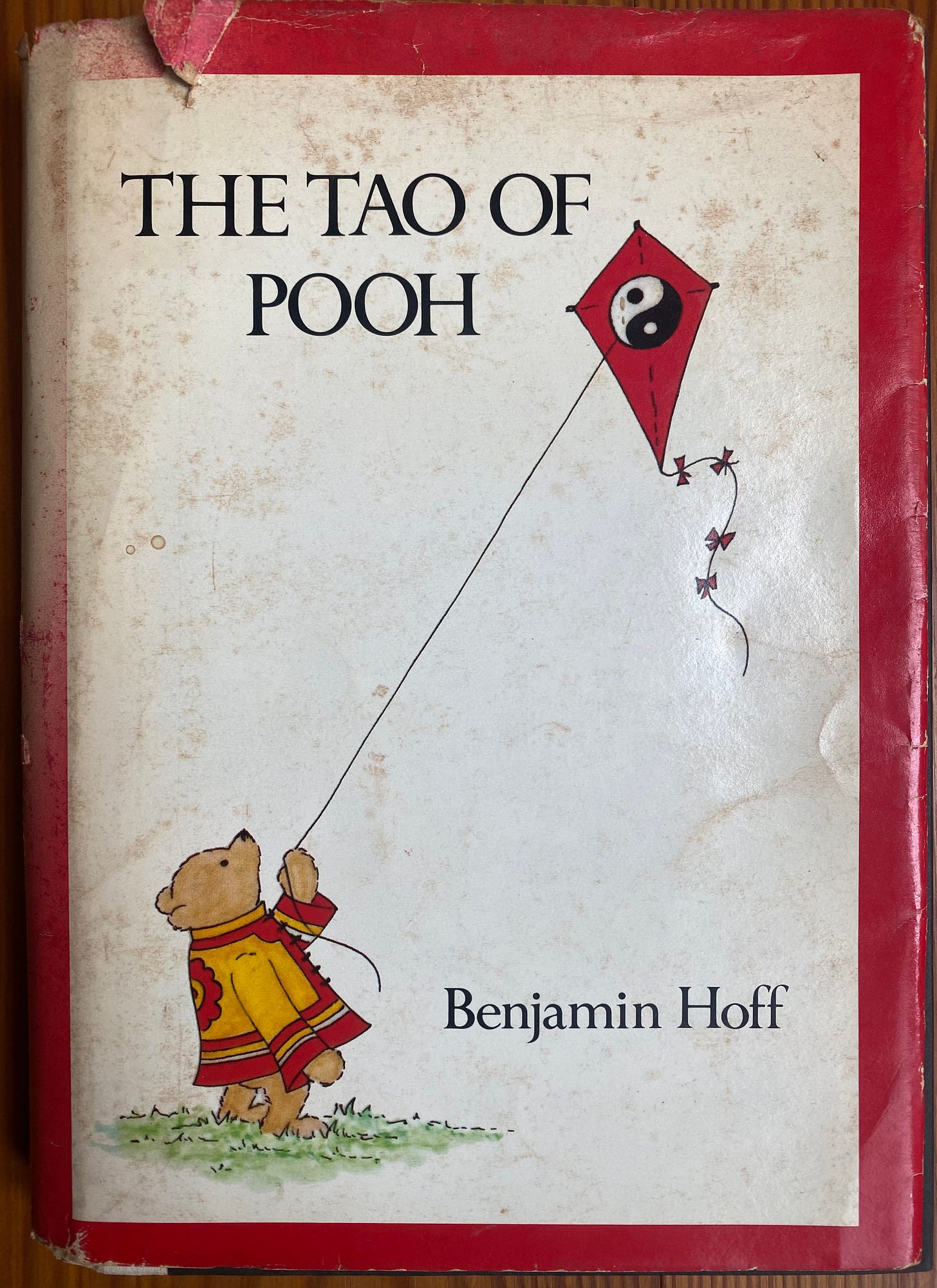
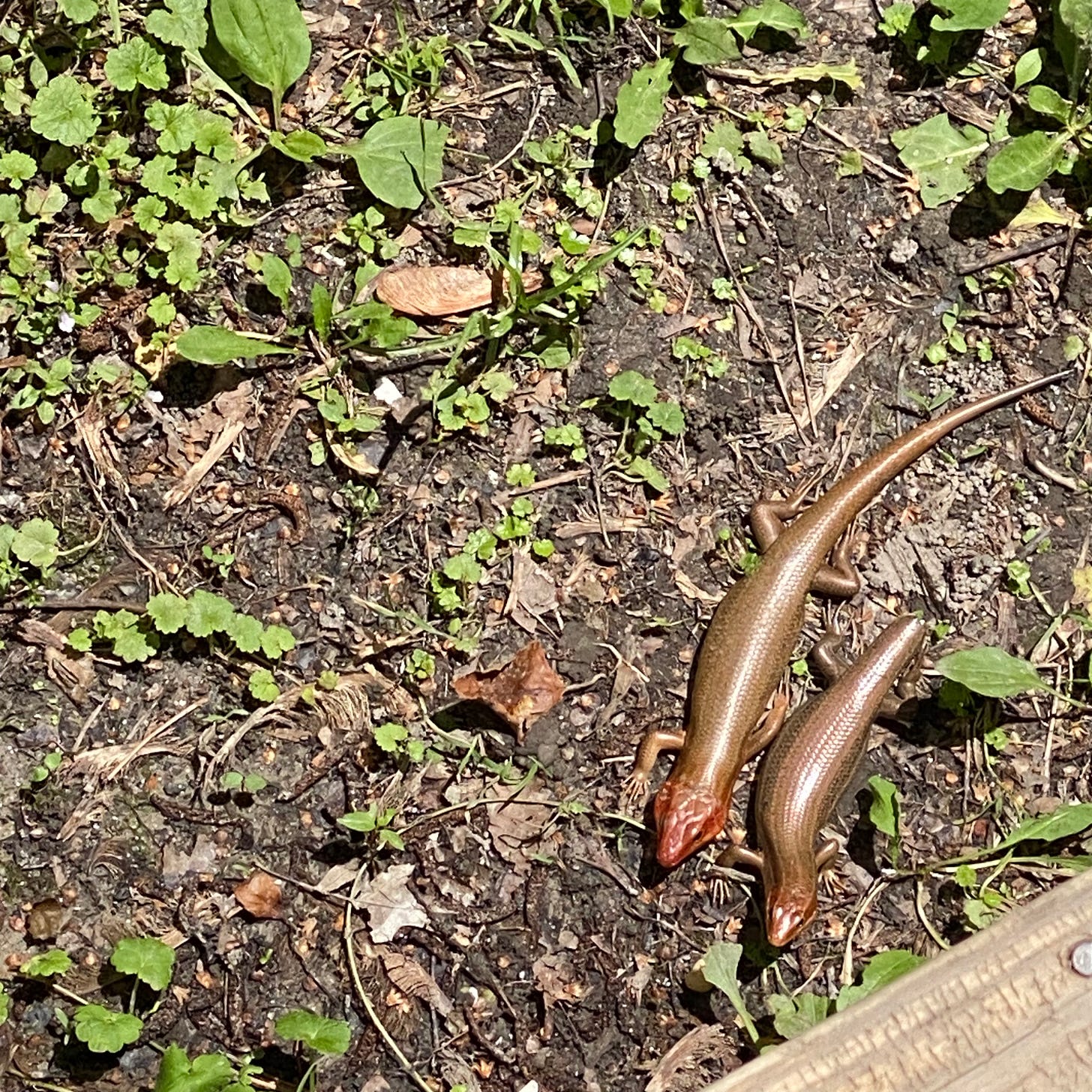

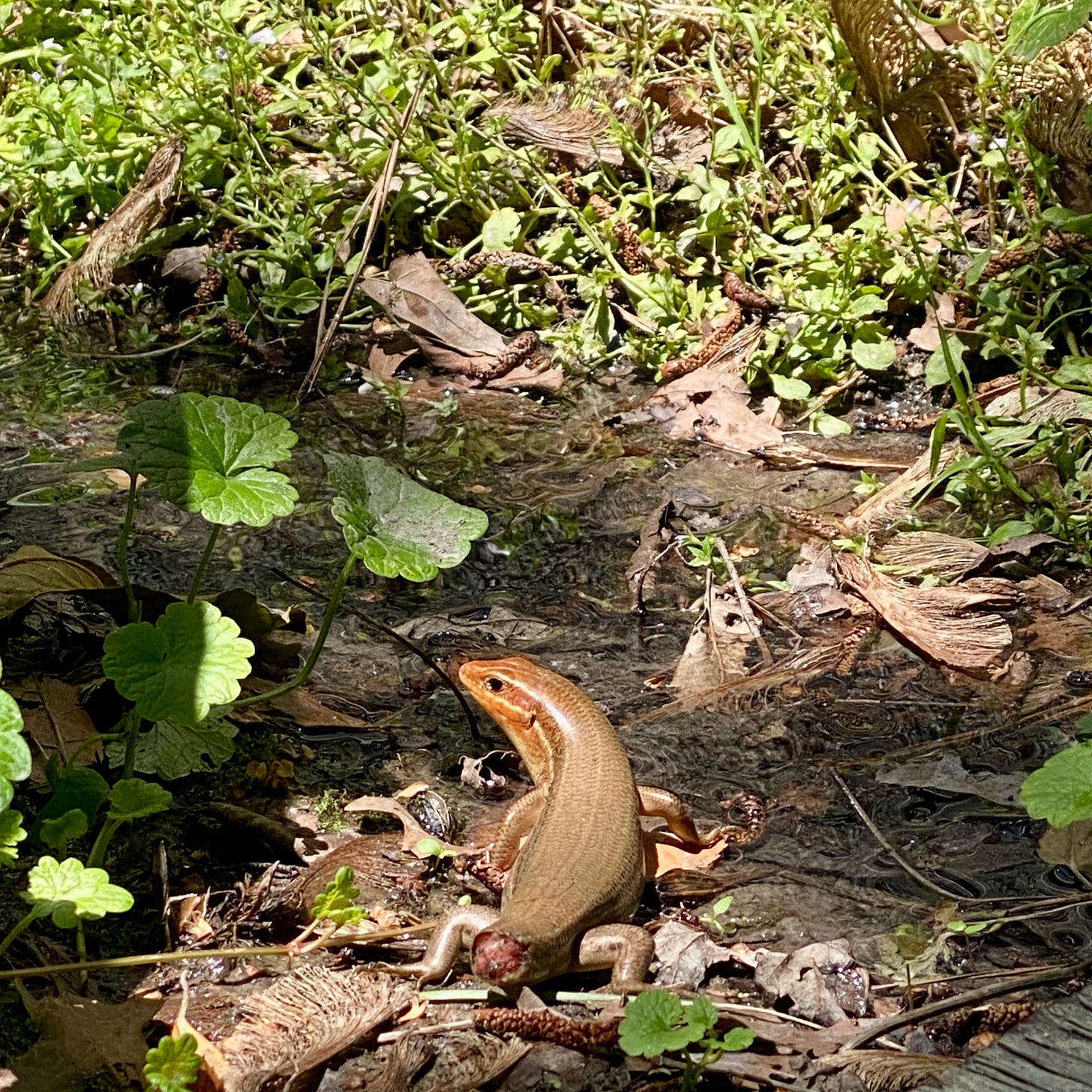
Marvelous magic in the garden! Nothing compares to the natural world and we're part of it with this amazing gift of deciding how to spend our time. Love your photos too! You take me right to Mary Oliver's "Pay attention. Be astonished. Tell about it." And this from Annie Dillard in "The Writing Life." "How we spend our days is, of course, how we spend our lives. What we do with this hour, and that one, is what we are doing. A schedule defends from chaos and whim. It is a net for catching days. It is a scaffolding on which a worker can stand and labor with both hands at sections of time. A schedule is a mock-up of reason and order- -willed, faked, and so brought into being; it is a peace and a haven set into the wreck of time; it is a lifeboat on which you find yourself, decades later, still living."
Thanks, Elizabeth. You enriched my morning immensely and I'll be looking for more of these gems. BTW, I am currently reading "Natural Magic: Emily Dickinson, Charles Darwin and the Dawn of Modern Science" by Renée Bergland.
She does without doing. Love this. "Oh bother," said Pooh.